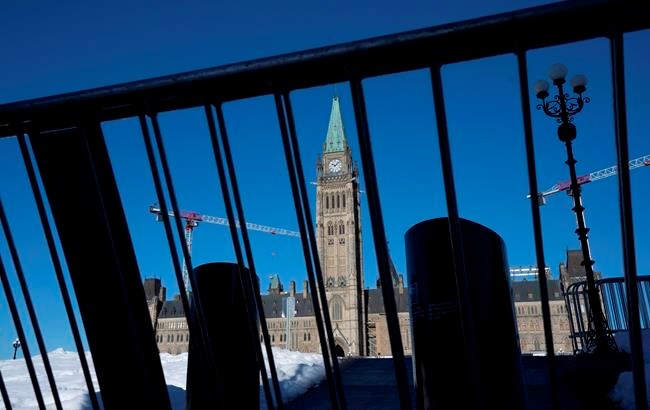OTTAWA — Protesters returned to Ottawa in significantly smaller numbers on Tuesday to mark the one-year anniversary of the Liberal government's historic decision to invoke the Emergencies Act as "Freedom Convoy" protests gripped the capital.
City officials had said more police and bylaw officers would be on patrol due to possible "convoy activity" a year after demonstrators blockaded the city's downtown and several Canada-U.S. border crossings.
The Ontario Provincial Police said some of its officers were available in Ottawa, as well.
However, only about a dozen protesters were on Parliament Hill by mid-afternoon amid a heightened police presence. By late afternoon, the crowd shrunk to fewer than five people.
Ottawa police said in a written statement Tuesday evening that the increased enforcement and public announcement about possible demonstrations was part of a commitment to "keep the community informed."
"It was based on information available to police and our partners regarding possible convoy activities," the statement said.
Prime Minister Justin Trudeau and his government invoked the Emergencies Act on Feb. 14, 2022, for the first time since it replaced the War Measures Act in 1988.
In declaring a public order emergency, the government granted extraordinary powers to authorities to limit protesters' movements and freeze bank accounts.
The decision was made in response to the weeks-long occupation of downtown Ottawa by “Freedom Convoy” protesters opposed to COVID-19 public health restrictions and holding general grievances with Liberal government.
As a requirement of the law, a federal commission of inquiry was held to investigate the circumstances surrounding the emergency declaration and the government's decision to invoke the act.
Justice Paul Rouleau led the Public Order Emergency Commission, which reviewed thousands of documents and heard from dozens of high-level witnesses, including Trudeau, during public hearings last fall.
Rouleau was given 360 days to deliver his report in both official languages and it is expected to be released no later than Monday.
Public Safety Minister Marco Mendicino said he is looking forward to receiving the final report.
He said he is expecting it will include recommendations and lessons for the government to review. The report could recommend changes to modernize existing federal laws, including the Emergencies Act itself.
Cara Zwibel, a lawyer who represented Canadian Civil Liberties Association at the public inquiry, said her group maintains that Rouleau’s work was hampered because the government did not share relevant information, including the legal opinion used to justify its decision to invoke the Emergencies Act.
“We need to look at creating some clearer rules around what the government is going to be expected to hand over in the commission process,” she said.
This report by The Canadian Press was first published Feb. 14, 2023.
David Fraser, The Canadian Press



